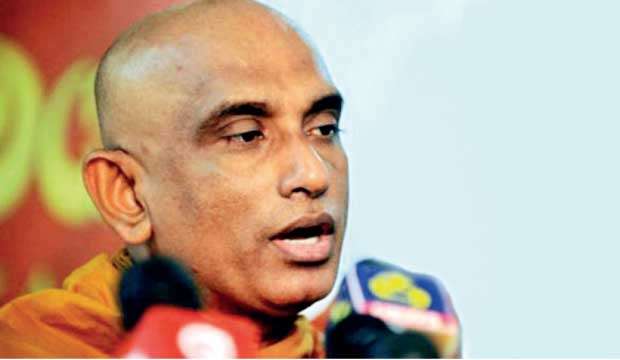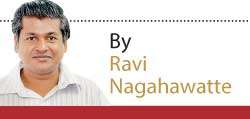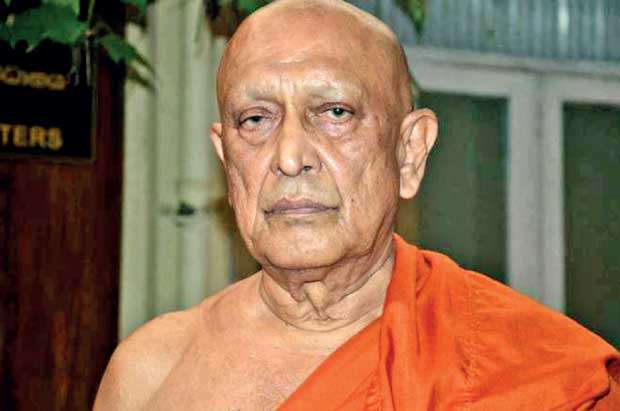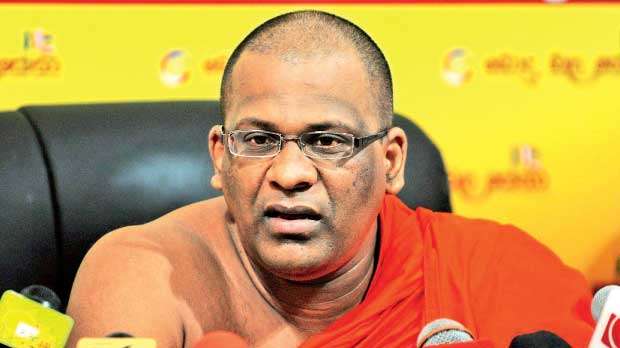Opinions wrapped in saffron robes

Did Ven. Athureliye Rathana Thera take a wise decision to vacate the post of presidential adviser?
- Those country leaders who apposed the views of Buddhist monks or ignored their presence soon learned from their mistakes
- But what must be taken note of is that these monks functioned in their roles in worldly affairs in an unofficial capacity
- From the times of the British occupying Sri Lanka, monks clad in saffron robes have had a presence in almost all the struggles
 2018-08-02
2018-08-02Monks have played pivotal roles in shaping the political face of Sri Lanka. From the times of the great kings to the many prime ministers and presidents who ruled this island, the opinion, more than the advice, of the Buddhist clergy has carried weight.
 Those country leaders who apposed the views of Buddhist monks or ignored their presence soon learned from their mistakes. One such leader was the late Ranasinghe Premadasa who initially ignored Ven Galboda Gnanissara Thera (fondly known as Podi Hamuduruwo) when he landed himself in the president’s seat.
Those country leaders who apposed the views of Buddhist monks or ignored their presence soon learned from their mistakes. One such leader was the late Ranasinghe Premadasa who initially ignored Ven Galboda Gnanissara Thera (fondly known as Podi Hamuduruwo) when he landed himself in the president’s seat. When Premadasa observed that things weren’t going too well regarding his political work in Colombo the president forged important ties with the priest and temple.
One monk who has gone public with the displeasure he harbours because his views weren’t sought by the head of state is Ven. Athureliye Rathana Thera. The monk has conveyed that he no longer wishes to hold this post because he was never made use of in his capacity as presidential adviser. The monk is reported to have made this statement at the recent 30th Anniversary celebrations of the Sri Lanka Women’s Development Cooperative Society in Colombo.

The Late Ven Sobitha Thera
This island’s history reveals that a monk’s role was never restricted to the temple. From the times of the British occupying Sri Lanka, monks clad in saffron robes have had a presence in almost all the struggles which were carried out to build a better and safer nation. But what must be taken note of is that these monks functioned in their roles in worldly affairs in an unofficial capacity.Ven. Athureliye Rathana Thera was appointed officially to be the president’s adviser. Does all this indicate that the unofficial system works better for monks in Sri Lanka because the priests who functioned this way were powerful and got many tasks accomplished? One such priest who wielded much power was Ven. Seelankara Thera of Dimbulagala whose work was patronised by President Ranasinghe.The monk must now start thinking whether his worldly views go well with the Yahapalana Government, which only wishes to work on its own ideas. This is despite seasoned politicians warning about where this Government is heading
We also had firebrand monk Ven. Sobitha Thera who played a key role in the National Movement for a Just Society which toppled the dictatorial Government headed by Mahinda Rajapaksa, in 2015. The late monk, who possessed a degree in history from the Vidyodaya University, was renowned for his oratory skills and most importantly for the change he made in society through his non-violent movement.
But before the National Movement for a Just Society kicked off the ground, the Rajapaksa Government allowed a monk in the name of Ven. Galagoda Aththe Gnanasara to cause racial tension in the island through his activities. It was alleged that former Defence Secretary Gotabaya Rajapaksa was backing this monk to the hilt. Gotabaya has denied this claim repeatedly. This monk claimed that he was on a mission to keep a check on the work of Muslim extremists, Christian fundamentalists and many unauthorised constructions that existed close to Buddhist temples. What worried people was how the monk wielded so much power, in an unofficial capacity, when there is a law and a police force operating in the country.
This monk then was functioning as the Secretary of the Bodu Bala Sena, but that’s besides the point because according to the rules on discipline stipulated in the Buddhist order for monks, there is no provision for monks to engage in politics; a fact which questions Ve, Gnanasara’s journey in robes because he was a candidate for the Jathika Hela Urumaya at the 2014 Parliamentary Elections.
Monks have always preferred their unofficial roles in politics. Even at present politicians in the Government and the opposition make quick visits to the temples of Most Ven. Thibbotuwawe Sri Siddartha Sumangala Thera of the Malwatte Chapter and Ven. Warakagoda Gnarathna Thera of the Asgiriya Chapter when they get fresh appointments in ministries. This is because they need the blessings and approval of the clergy for their work.Monks have always preferred their unofficial roles in politics. Even at present politicians in the Government and the opposition make quick visits to the temples of of the Malwatte and Asgiriya Chapters when they get fresh appointments in ministries.

Ven. Galagoda Aththe Gnanasara Thera
Ven. Athureliye Rathana Thera has impressed many with his views on economic matters. He very recently aired his views on the use of Glyphosate in Sri Lanka. The monk has called for an internationally accepted legal document to be formulated for the regulation of Glyphosate. This is a monk who could have been one of those rare members of the Buddhist clergy whose views were sought by the law makers while functioning in an official capacity. This didn’t happen. The monk must now start thinking whether his worldly views go well with the Yahapalana Government, which only wishes to work on its own ideas. This is despite seasoned politicians warning about where this Government is heading.Ven. Rathana Thera must understand that monks have taken to entering parliament as the best option to air their views. He has also made an impact on the political platforms which feature representatives of Jathika Hela Urumaya. But it seems that the hierarchy in the Yahapalana Government don’t fancy what the priest can bring to the table at political discussions. It seems a wise move by this monk disembark from this ‘Yahapalana Ship’ which is right now looking into the Abyss.He very recently aired his views on the use of Glyphosate in Sri Lanka. The monk has called for an internationally accepted legal document to be formulated for the regulation of Glyphosate. This is a monk who could have been one of those rare members of the Buddhist clergy whose views were sought by the law makers
